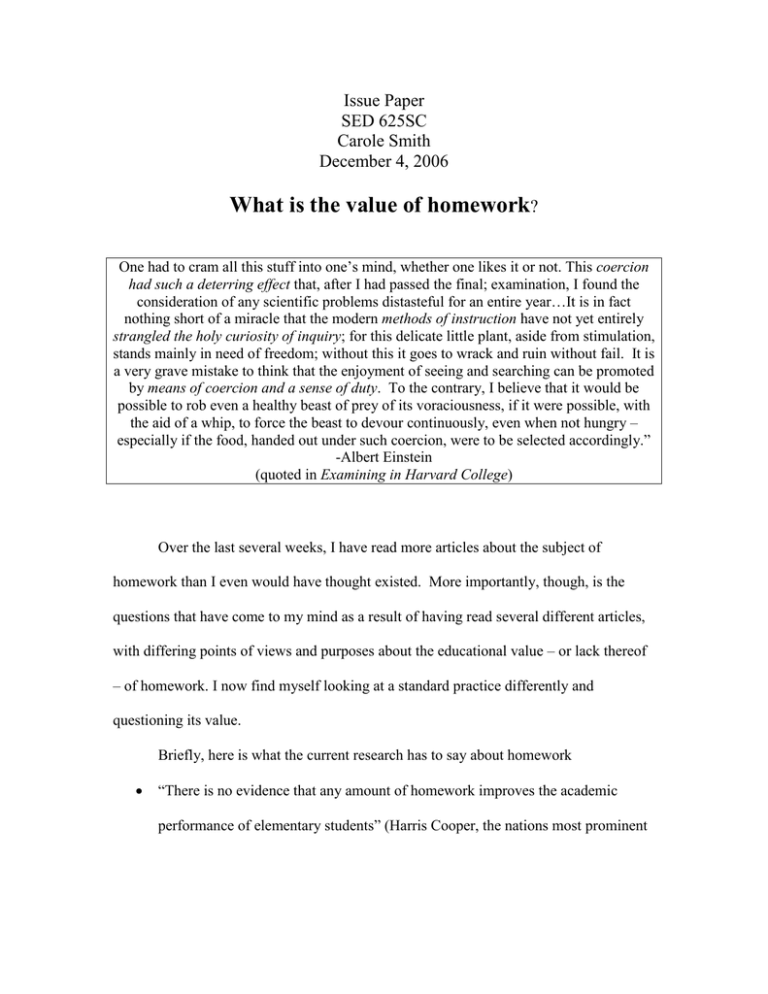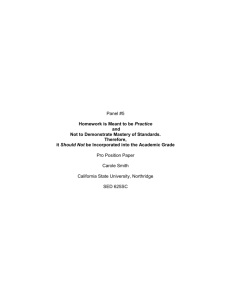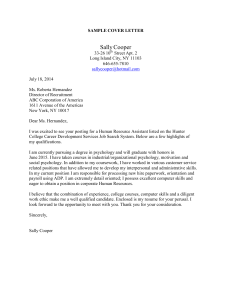What is the value of homework Issue Paper SED 625SC Carole Smith
advertisement

Issue Paper SED 625SC Carole Smith December 4, 2006 What is the value of homework? One had to cram all this stuff into one’s mind, whether one likes it or not. This coercion had such a deterring effect that, after I had passed the final; examination, I found the consideration of any scientific problems distasteful for an entire year…It is in fact nothing short of a miracle that the modern methods of instruction have not yet entirely strangled the holy curiosity of inquiry; for this delicate little plant, aside from stimulation, stands mainly in need of freedom; without this it goes to wrack and ruin without fail. It is a very grave mistake to think that the enjoyment of seeing and searching can be promoted by means of coercion and a sense of duty. To the contrary, I believe that it would be possible to rob even a healthy beast of prey of its voraciousness, if it were possible, with the aid of a whip, to force the beast to devour continuously, even when not hungry – especially if the food, handed out under such coercion, were to be selected accordingly.” -Albert Einstein (quoted in Examining in Harvard College) Over the last several weeks, I have read more articles about the subject of homework than I even would have thought existed. More importantly, though, is the questions that have come to my mind as a result of having read several different articles, with differing points of views and purposes about the educational value – or lack thereof – of homework. I now find myself looking at a standard practice differently and questioning its value. Briefly, here is what the current research has to say about homework “There is no evidence that any amount of homework improves the academic performance of elementary students” (Harris Cooper, the nations most prominent homework researcher, after an exhaustive meta-analysis conducted in the 1980’s and then confirmed in 20061). At best, most homework studies show only an association, not a causal relationship. No evidence supports the idea that homework provides nonacademic benefits. The idea that homework teaches good work habits or develops positive character traits could be described as an urban myth except for the fact that its taken seriously2. As a teacher, and one that has always assigned homework, reading these new perspectives was intriguing. At first it seemed that many articles were contradicting each other, but more careful reading showed that not to be true. While many articles argue that homework is beneficial, teaching life skills such as organization and time management, those same articles will, at some point, admit that there is not any current empirical evidence to support that, only what could be considered as anecdotal evidence. Other articles point that there is evidence that more time spent on homework shows an improvement in student achievement, but at some point will admit to that only being the case in high school. Interestingly, research consistently shows the greatest positive correlation between homework and achievement to be in mathematics courses. The initial meta-analysis was published as Harris Cooper, Homework (White Plaines, N.Y.:Longman, 1989); it was then released in an abridged and slightly updated version as The Battle over Homework, 2nd ed. (Thousand Oaks, Calif.: Corwin, 2001). The quotation appeared on p. 109 of the 1989 edition. The recent analysis is Harris Cooper, “Does Homework Improve Academic Achievement? A Synthesis of Research , 1987-2003,” Review of Educational Research, vol. 76, 2006, pp.1-62 2 S. Zeigler, “Homework,” in Encyclopedia of Educational Research, 6th ed., vol.2 [New York: Macmillan, 1992], p. 603 Reflecting upon the results of this data has brought about several unanswered questions to me, such as: Research does not show that students achieve more with more time on homework. Perhaps that is because gifted students that have mastery of material do not need to do homework, for whether they spend 5 minutes or an hour on their homework, they will test in the top percents. Why has research not considered students IQ measures as a differential? When the research looks at time spent weekly on homework, why is it not being considered by its frequency; i.e. if a student is doing two hour of homework a week, how many chunks is it broken up into? Does the frequency of homework affect achievement? Does doing unsupervised homework lead students to internalize incorrect routines? Is there a correlation between homework and grade inflation? Coming from the perspective of a “life-long student” that is conditioned to doing homework, it is not surprising that, without any thought or pre-planning, I automatically assigned homework as a new teacher. In the several years since then, my attitudes have changed somewhat; I spend more time deciding upon appropriate assignments and believe that homework should be collected, graded, and returned. It is part of the joy of teaching to try to instill a love of learning in our students, and it is hard to do this when one is inundating students with tedious and repetitive homework assignments. Yet, I still do see merit in carefully thought out assignments that allow students to practice new material and skills. Perhaps that is partly due to the subject matter that I teach (advanced chemistry) with its heavy emphasis on mathematics. I strongly question now the value of homework in elementary school students, with the exception of having students read regularly at home as well as at school. To guide myself in my teaching, I have come to the following conclusions from the research I have read: 1. Homework assignments must be relevant to the topic covered in class and should reinforce what has been taught. 2. If the homework is important enough to be assigned, than it is important enough to be graded. 3. Homework should serve as a communication tool, with written feedback to student. 4. Homework should not be weighted heavily in students grades It is an interesting time to be an educator. Not a day goes by without an article in the Los Angeles Times about education: what is believed to work, what isn’t, immigration, standardized testing, the education budget, its administration, etc. I find it interesting to now understand the “history of homework”, how since the 1950’s with Sputnik, America has been racing to bring its students to higher levels of achievement, and has used homework as a tool in that quest. Now, 50 years later, repeated research is showing that homework does not lead to greater academic success. It appears that an entire paradigm shift is required, and with a nation that is slow to change I don’t foresee that happening. As educators continue to look at how students learn, perhaps it is equally valuable to look at how they don’t learn. References 1. Bempechat, Janine. 2004. “The Motivational Benefits of Homework: A Social Cognitive Perspective.” Theory into Practice 43 Summer 2004: 189-196 2. Knore, C. Leon. “Grade Inflation in Elementary or Secondary Students’ Progress Reports: The Contribution of Homework of Extra-Credit Projects.” American Secondary Education v24 1996: 11-18 3. Kohn, Alfie. “Abusing Research: The Study of Homework and Other Examples.” Phi Delta Kappan 88 Summer 2006: 9-22 4. Anderman, E.M., T. Griesinger, and G. Westerfield. 1998. “Motivation and Cheating During Early Adolescence.” Journal of Educational Psychology 90: 84-93. 5. Butler, R. 1987. “Task-Involving and Ego-Involving Properties of Evaluation: Effects of Different Feedback Conditions on Motivational Perceptions, Interest, and Performance.” Journal of Educational Psychology 79: 474-82. 6. Butler, R, and M. Nisan. 1986. “Effects of No Feedback, Task-Related Comments, and Grades on Intrinsic Motivation and Performance.” Journal of Educational Psychology 78: 210-16. 7. Cooper, H. 1989. Homework. White Plains, NY: Longman. 8. Dewey, John. Interest and Effort in Education. New York: Collier, 1963. 9. Grolnick, W.S. and R.M. Ryan. 1987. “Autonomy in Children’s Learning: An Experimental and Individual Difference Investigation.” Journal of Personality and Social Psychology 52: 890-98. 10. Jongsma, Eugene. “Homework: Is it Worthwhile?” Reading Teacher 38 (1985): 7024. 11. Kohn, A. “From Grading to De-Grading.” High School Magazine v6, n5 March, 1999 pp. 38-43. 12. Kohn, A. “The Dangerous Myth of Grade Inflation.” Chronicle of Higher Education. November 8, 2002, pp. B7-B9. 13. Salili, F., M.L. Maehr, R.L. Sorensen, and L.J. Fryans Jr. 1976. “A Further Consideration of the Effects of Evaluation on Motivation.” American Educational Research Journal 13: 85-102.



